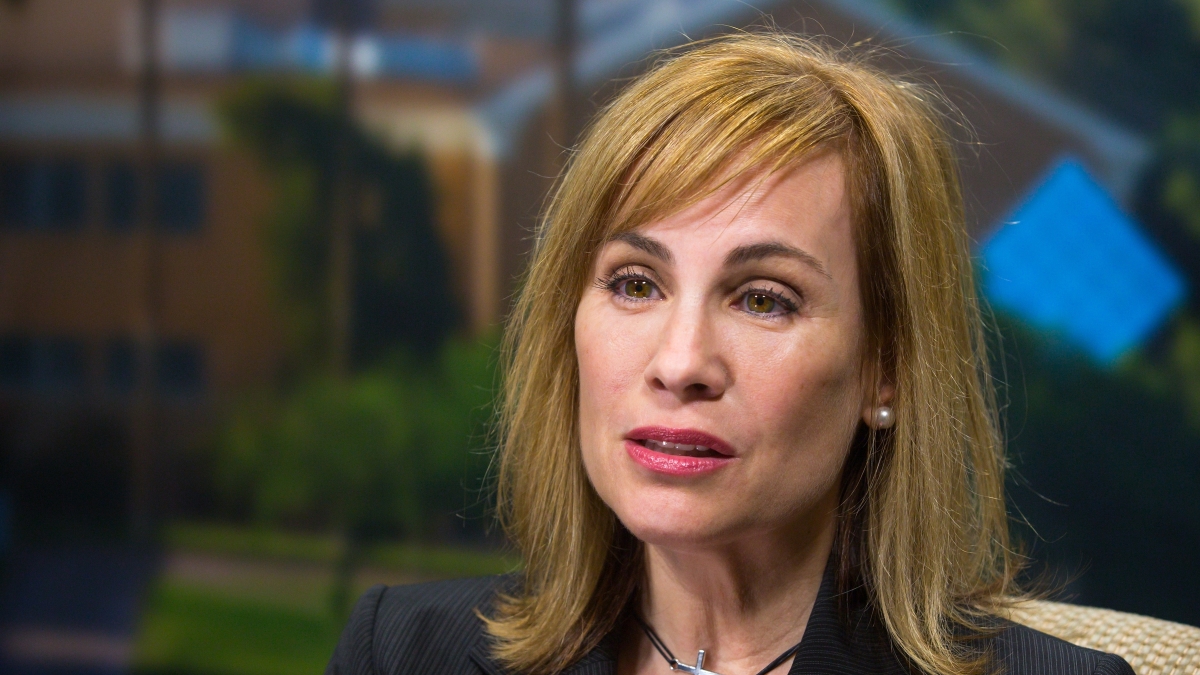Adriana Sanford, an alumna of Arizona State University and now a professor there, has been elected to the board of directors of Amnesty International USA. The Chilean-American author, international corporate lawyer and media personality will be the only Hispanic person on the board.
Sanford, who teaches law, international management and business ethics as a clinical associate professor of management at the W. P. Carey School of Business, has focused her research and career on international and comparative law.
Her current research centers on privacy and data protection reform, human-rights-related risks in the global supply chain, and sorting through proliferating anti-corruption standards from new and diverse foreign legislation that may conflict with one another.
By being part of Amnesty International — a human-rights organization in more than 150 countries that campaigns to end abuses including the death penalty, torture and discrimination — “I wanted to contribute my passion and knowledge to this grass-roots international human-rights movement of over 7 million members and strong supporters around the globe,” Sanford said.
SanfordSanford is a visiting research professor of the Universidad de Talca, Facultad de Economia y Negocios in Chile and a Dean’s Visiting Scholar of Georgetown University Law Center. She holds a law degree from the University of Notre Dame and a dual master's of law degree from Georgetown University Law Center. Follow her on Twitter at @profasanford, who is also a frequent expert commentator on the CNN Spanish-language show “CNN Dinero” and a senior international correspondent for Manufacturing Talk Radio, answered some questions from ASU Now.
Question: You teach business ethics, and your goal is to educate consumers. What should they know about counterfeiting?
Answer: The use of counterfeit goods is increasingly prevalent across all industries and often affects consumers’ health and safety. Unfortunately too often consumers confuse the concept of “counterfeit” with “generic”; a potentially dangerous error.
Product counterfeiting includes ingestible goods, such as chickens’ eggs, beer, chocolates or medicines. Counterfeit pharmaceuticals include products without active ingredients, the wrong ingredients or with high levels of impurities and contaminants. Some examples of dangerous ingredients found in counterfeit pharmaceuticals and food include arsenic, boric acid, floor polish and even leaded road paint.
The counterfeiting of medicines is an especially lucrative business due to the continued high demand for medicines in this country and the cost of health care. It is important for consumers to understand that counterfeiters have no regard for consumers’ personal safety. The elderly are particularly at risk. Incorrect quantities of active ingredients can also create drug-resistant diseases, which potentially harm our society at large.
Because counterfeit products have become the “preferred method of funding” for a number of insurgents, companies can no longer afford to turn a blind eye. The counterfeiting of luxury goods such as purses, watches and shoes are particularly easy targets as items are moved with speed and provide abundant cash, while simultaneously providing a certain level of anonymity.
The FBI compiled evidence that the terrorists groups who bombed the World Trade Center financed their activities with counterfeit textile sales sold in New York. Some knockoffs can also cause a catastrophic loss of lives — the U.S. Federal Aviation Administration estimated that 2 percent of the 26 million aircraft components installed each year were counterfeit, which equaled approximately 520,000 parts.
Q: You’re an expert in international and comparative law. How are companies affected when countries have different laws?
A: Complying with multi-jurisdictional requirements that have significant implications for constitutional and privacy rights remains among the primary concerns, particularly when laws compete or conflict with one another.
Companies and their senior executives could face severe penalties for non-compliance, including personal criminal liability.
When terrorists raise funds from “legitimate sources,” the detection and tracking of these funds becomes more difficult. The whistleblowers’ inside knowledge of crucial information has become of invaluable worth and a critical component of the international regulatory and supervisory system. ...
It is clear that complex jurisdictional and security issues must be addressed through a global lens to avoid these predicaments. Solutions may be beyond one country’s national interests, and decisions may have strong repercussions on a global scale and the environment in which organized crime develops is constantly evolving.
Q: How might this play out globally?
A: There are potential ramifications for the American economy at large and businesses in all sectors, particularly the technology sector.
U.S. law enforcement will continue to face challenges in their efforts to keep us safe particularly stemming from the “encryption explosion.” The FBI is rightfully concerned about the effects that new technology could potentially have on investigations, including the risk that criminal and terrorist groups may “go dark” by using encryption technology to duck the attention of the law.
Cordial international relations are sometimes at risk, and reforms are needed across the globe to build confidence and trust. Privacy and security rights must be carefully weighted and balanced, as they have major implications on a global scale, on our trade agreements, and on fundamental rights.
We need an international legal process for handling issues that may have a strong international impact on human rights or have the potential to create conflicts of law.
Q: How you think the international refugee crisis has affected attitudes about globalization?
A: We can’t afford to be indifferent to one of the world's worst humanitarian crises.
Human-rights-related abuses will continue to exist on an enormous scale around the globe. The eradication of these abuses will require a global coordinated effort across governments and law enforcement with the assistance of the private sector.
We’re all interrelated. If we don’t help weaker countries, we won’t be able to solve our own issues.
Top photo by Charlie Leight/ASU Now
More Business and entrepreneurship

When self-leadership turns self-destructive
Self-leadership is a relatively new practice of understanding who you are and developing strategies to motivate yourself to achieve a desired goal. When applied correctly, it can help a leader…

New ASU business graduate degrees meet emerging market needs
Following the successful launch of the nation's first graduate program in artificial intelligence in business, the W. P. Carey School of Business at Arizona State University is adding to and…

3 ways to start sounding like an executive
Story by May BuschEditor's note: This story was featured in the winter 2025 issue of ASU Thrive.Whether you love meetings or hate them, they are golden opportunities to demonstrate your executive…
